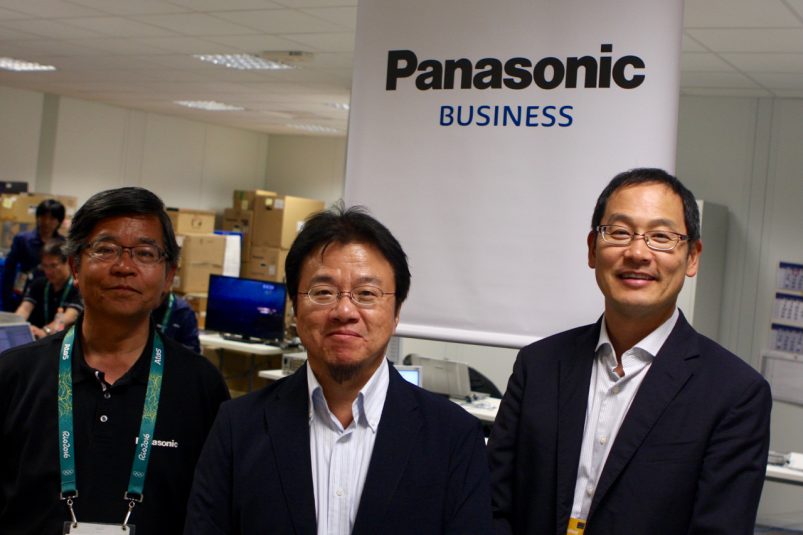Live From Rio 2016: Panasonic Plays Key Role for Ceremonies, Olympic News Channel Ops
Panasonic’s Imaging Network Business Division (INBD) is once again on hand at an Olympic Games, providing important technologies and support to the Opening Ceremony (projectors and switcher used in the staging and production were all provided by Panasonic) as well as a massive technical deployment of equipment in use by OBS for athlete interviews, press conferences, and Olympic News Channel operations.

From left: Panasonic INB Division’s Koji Yamamoto, Kunihiko Miyagi, and Kiyoshi Tsumagari at Rio 2016, where Panasonic has more than 100 P2 cameras and decks in use by OBS
Kunihiko Miyagi, director, Professional Video Business Unit, INBD, and Kiyoshi Tsumagari, GM, sales/marketing, INBD, flew in from Osaka, Japan, near the end of the Games to see firsthand how the Panasonic support team of 10 professionals and the equipment were holding up.
“Our mission is to contribute to the growth of the imaging culture and also to our customer’s success, and the mission at the Olympic Games is to support the sports,” says Miyagi. “So here our mission is aligned to support the Games. The Olympics mean a lot to us and are a way to evolve our technology and innovation.”
This year, the Olympic News Channel has deployed 100 Panasonic AJ-PX500 camcorders and 100 recorder decks operating in AVC-Intra100 mode in a wide variety of newsgathering applications. In addition, more than 1,300 Panasonic monitors are being used across Rio at various venues, as well as at the IBC. In addition, more than 100 Panasonic LED screens are scattered around the various venues to provide information and replays for fans in the stands.
The Panasonic relationship with the Olympics goes all the way back to the 1984 Los Angeles Olympics, but it was for the 1992 Barcelona Games that the company became a technology partner with the Olympics host broadcast division (now OBS).
It was still a tape-based world back then, and one of the new developments was Panasonic’s D3 format, which offered digital acquisition. Panasonic also provided three turnkey production systems that were used at the IBC and the athletics and gymnastic venues in Barcelona.
“It was a very good challenge for us,” says Koji Yamamoto, deputy GM, INBD.
The current relationship with OBS runs through the 2024 Games, the location of which is still to be determined. But between now and then are the 2020 Tokyo Olympics.
“The Tokyo Games will have a very big meaning for us, and we will provide a total solution,” says Miyagi. “Between now and then, we need to develop new technologies and innovate and provide the newest technology for the newest way of viewing the Olympics. There will an evolution of image quality that includes 4K, 8K, and HDR. We will develop 8K technologies toward 2020.”
Progress on the 8K front is already being made. At the 2012 London Olympics, recording 8K signals required more than 30 P2 decks to be linked to record one signal. Now that recording can be done in a small unit only a couple of racks tall.
And then there is the potential for the VR format.
“We now have a 360-degree camera so the viewer can view it as if they are at the event,” Miyagi reports. “We already have an HD prototype, and we are close to developing an 8K version.”
